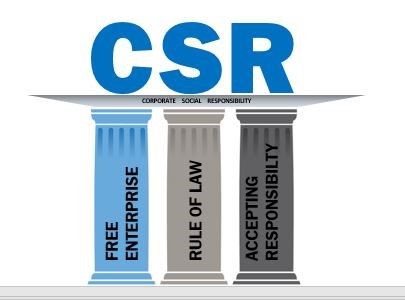Democratic societies with thriving economies depend on 3 Underlying Components: FREE ENTERPRISE, RULE OF LAW, and PEOPLE ACCEPTING RESPONSIBILITY FOR THEIR OWN SITUATION. It would benefit everyone engaged in CSR to build on and promote these components for continued success.
How these components apply to CSR
There are several reasons why companies take CSR seriously. One is they recognize that it is in their self-interest to choose to support their community. This is an important factor. Corporations get involved in areas of their choice or their business alignment to strengthen the long-term well-being of the community they serve and the people who live there. By doing so, they make their community stronger and create conditions to improve their business.
Supporting the community requires resources. This is achieved by businesses following the principles of free enterprise, which provide opportunities to achieve prosperity based on hard work and potential.
Protected by the rule of law, corporations engaged in CSR can feel certain about the commitments that they make.
A quick overview of the components
Free enterprise has a track record of being the most productive, efficient, innovative, adaptable, and job-creating economic system, bringing prosperity and quality-of-life to the most people. It is based on people saying, “I can bring better products or better services to a segment of the marketplace than presently exist.” They need to marshal their own resources. Some succeed. Some don’t. It’s the marketplace that decides, not government bureaucrats or other people of power. Many CEOs see partnering with nonprofit organizations as another form of free enterprise, as they can choose to commit to ones that provide the best value and achieve the results they demand.
The rule of law together with honesty and integrity is the second component. This protects rights and creates confidence that a fair marketplace depends on. In case of disagreements, it provides through a judicial system the most honest resolution process.
People accepting responsibility for their own situation rather than looking constantly to government or others to solve their problems is the third component. America became the land of opportunity because we had a tradition of people coming to this country and accepting responsibility for their own situation. Often, they did not know the language. They were poor. Frequently, they had to sleep 10 in a room. They sacrificed and worked hard to make many of their own dreams come true. Many of them were supported by nonprofits, who helped make it possible for them to benefit from the 3 Underlying Components.
Most nonprofits are built on free enterprise principles
Nonprofits do a wonderful job serving the humanistic values of the community. They help shape the quality of life – from education to health to the arts and social services. They also provide a valuable safety net when needed. As with companies, the principles of free enterprise apply to them. To succeed, they need to raise their own funds, attract their own constituents, and fulfill their missions within their budget, or fail.
With the 3 Underlying Components, many companies implementing CSR are thriving in today’s economy
They are contributing to creating stronger communities. At the same time, they are seeing a return in both economic and social capital for their business, with the added benefit of attracting better talent.


